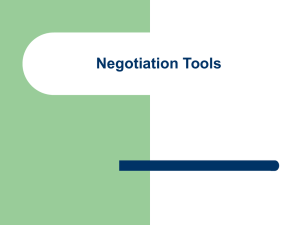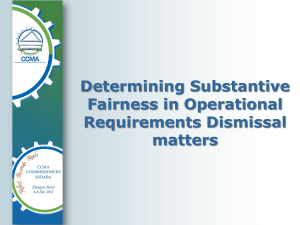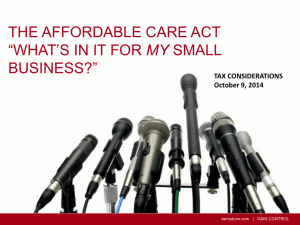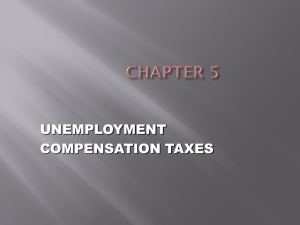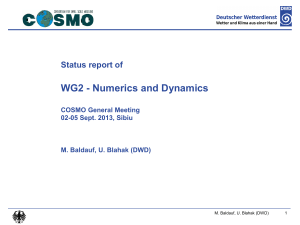Employer Liability Protests
advertisement
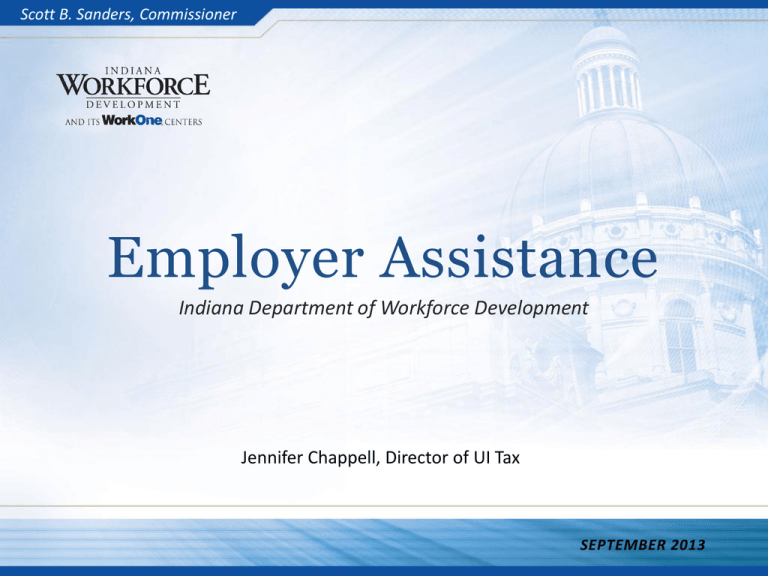
Scott B. Sanders, Commissioner Employer Assistance Indiana Department of Workforce Development Jennifer Chappell, Director of UI Tax SEPTEMBER 2013 Employers: Make Your Move to Uplink TODAY! Uplink, Indiana’s unemployment insurance filing system, will help you manage your unemployment insurance account online 24 hours a day, 7 days a week. Through Uplink Employer Self Service (ESS) you can: (317) 234-3182 •Manage your employees’ unemployment insurance benefit claims •Upload quarterly wage files •View account history •File quarterly contribution reports Start managing your account online today at www.in.gov/dwd Forms How to Reach Us: • Employer TAX Hotline: 1-800-437-9136 • Employer Benefit Charge Questions: 1-800-891-6499 • Ask Work One Email: https://askworkone.in.gov/ • Indiana Career Connect: www.IndianaCareerConnect.com • Employer Handbook on Unemployment Insurance at: www.in.gov/dwd/files/Employer Handbook.pdf General Contact information: Jennifer Chappell, Director of UI Tax jchappell@dwd.in.gov 317-232-7698 4 Unemployment Insurance EMPLOYER PREMIUMS 5 Employer Contributions: • Federal Unemployment Tax Act (FUTA) o Taxable wage base on first $7,000/employee (CY) o 6.0% (credit up to 5.4% - reduced to 4.5% in 2013) • State Unemployment Tax Act (SUTA) o Taxable wage base on first $9,500/employee (CY) o Rate determined by experience o New Employer Rate: 2.50% o Minimum Earned Rate: 0.50% o Maximum Earned Rate: 7.40% o Penalty rate: Earned Rate +2.00% o New Construction Rate: 4.0% 6 Employer Quarterly Reporting • Quarterly Contribution Report – Self reporting of contribution due based on wages paid in the current and preceding quarters in this year. • Quarterly Wage Report – Wage reports should be filed through ESS or via e-media. If you want to file a hardcopy report, the wage report form must be downloaded from DWD Website: www.in.gov/dwd • Quarterly Wage Report Due Dates: Quarter Wages Paid Report Due Date First Jan, Feb, Mar April 30th Second April, May, June July 31st Third July, Aug, Sept October 31st Fourth Oct, Nov, Dec January 31st 7 Employer Premium Computation: 1. Applicable Rate Schedule 9 Schedules: A through I 2. Employer Type (based on account status on June 30 & past 36 mos. taxable payroll) a. New Employer b. Merit Employer c. Delinquent Employer d. Reimbursable 3. Experience Account Balance a. Two Types of Merit Employers: 1) Credit Reserve Balance Accounts 2) Debit Balance Accounts 8 Reimbursable Employers: • • • Not-for-profit and governmental employers may choose to be reimbursable employers. Reimbursable employers are responsible for repaying the state dollar-for-dollar for unemployment insurance benefits paid to former employees. All other employers are required to make regular premium payments. Become a reimbursable employer by: • Providing DWD a copy of your Internal Revenue Service (IRS) 501(c)(3) exemption status letter; and • Submitting a completed “Election to Pay Tax” form, DWD 1065, located at www.in.gov/dwd/2406.htm. Unemployment Insurance Successorship 10 Successorship • • • • If your business takes operational control of all or part of the assets of an existing (SUTA liable) business resulting in a change in the FEIN of the business, you are a successor employer under IC 22-4-10-6. The workforce of a business is considered to be an asset of the business. An “asset transfer only” is a successorship as defined by the statute. The successor must notify the Agency of the intended transfer in writing no less than 5 days prior to the intended date of the transfer. DWD will not hold the successorship until the actual date on which operational control transfers. The successor inherits the experience balance and liabilities of the predecessor. Timely filing of the intent to transfer protects the successor from being subject to a lien for debts owned by the predecessor, but not from the debts of the predecessor. If the successor employer is not SUTA liable in Indiana at the time of the transfer, the premium of the successor is equal to the premium assigned to the disposer (predecessor). The disposer must file their final report and notice of transfer concurrent with their last payroll date. Unemployment Insurance Abatement Requests 12 Abatement Requests The Unemployment Insurance Board has prescribed situations considered to be reasonable cause for abatement of the delinquency rate modification, penalty, or interest where timely and in-full payment of contribution has not been received by IDWD. Contribution can not be abated. Special Charges (Solvency Surcharge) cannot be abated. Reasonable cause includes: Acts of God, nature, war, or terrorism; Death or incapacitation of an owner or preparer; A timely mailed report not received by IDWD; Third party reliance where the agent has been removed or the situation has been corrected and cannot recur (penalty and delinquent rate abatement only); 13 Abatement Requests Reasonable Cause continued: Cash flow where the employer is in a valid repayment agreement before the expiration of the merit rate delinquency notice with proof of financial hardship (delinquent rate modification only); Administrative error with evidence that the situation will not recur; ESS payment error with proof of payment attempt (penalty only); Mail requests to: DWD Tax Administration ATTN: Abatement Request 10 N. Senate Ave. SE 202 Indianapolis, IN 46204 Be sure to include: • SUTA account number • Reason for the failure to make payment timely and in full • Documentation supporting the assertion of cause • Quarter and year affected 14 Unemployment Insurance Employer Liability Protests 15 Employer Liability Protests Liability ALJs conduct hearings concerning employer coverage and premium liability. ALJ’s jurisdiction includes disagreements between employers and DWD regarding: • Assessments for interest, taxes and penalties • Transfers of an employer’s experience balance and rates in cases of ownership transfers • Protests related to worker classification • Premium rates calculated by DWD • SUTA Dumping You may protest an initial determination by mailing notice to DWD Tax Administration ATTN: Director UI Tax Administration 10 N. Senate Ave. SE 202 Indianapolis, IN 46204 16 Employer Liability Protests • Protests should be filed on the form provided by the Agency. If you are not able to use the protest form, please submit your protest in writing and include the basis for your protest and a copy of the determination being protested. • The protest must be received within 15 days after the mailing date of the initial determination or notice being protested. • The LALJ will set a date for the hearing and notify the interested parties. • You can appear in person or by telephone and have an attorney represent you, although representation is not required. Legal representation is at your own expense. • The Liability Administrative Law Judge is specifically prohibited from making a determination of qualification for UI Benefits. Employer Liability Protests • Employer protests of UI Tax determinations are with regard to the correct application of the Act to their SUTA liability and are not considered Tax Protests for purposes of the Indiana Court of Appeals. • To be successful, the employer must show that DWD has incorrectly interpreted or applied the statute(s) to the facts surrounding their account. This may include the math underlying a calculation, as in the instance of a rate appeal or an appeal of a liability assessment, or it may be the application of the 1/2/3 test to employer / worker relationship in a compliance audit notice of findings. In each case, the employer must show the court that the application of the law is incorrect. When you are preparing your protest, please be sure to address the issue at the root of the determination. For example, if your premium increased because of claimant collection against your account, filing a protest of the rate calculation will not, generally, be successful in that the calculation of your rate does not give you an additional opportunity to protest a claim. • The decision of the ALJ becomes final 30 days after the mailing date, unless there is a filing of a Notice of Appeal within the 30 days, and a subsequent case filed with the Indiana Court of Appeals. The Notice of Appeal delays the decision for 30 days. Look at over 200,000 Hoosier resumes on www.IndianaCAREERconnect.com 19




